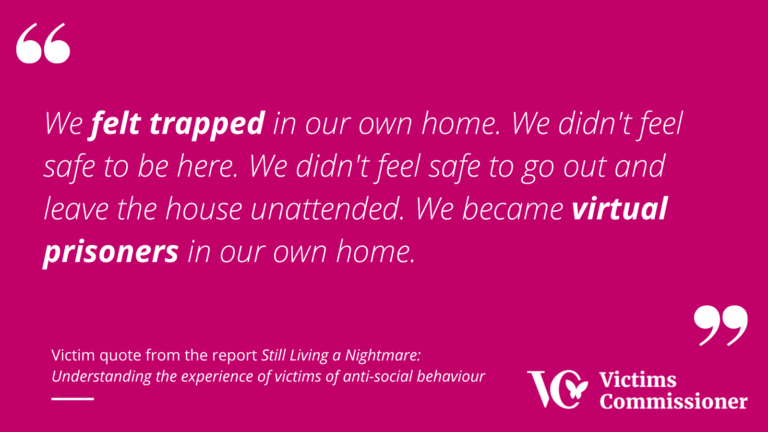BLOG: Victims of anti-social behaviour are still being pushed to the brink

Baroness Newlove’s report found people’s lives have been ‘severely impacted’ because of the failure of forces to act on complaints.
This op-ed first appeared in The Daily Telegraph on 9 September 2024 and accompanied the launch of the Victims’ Commissioner’s new report on anti-social behaviour.
In 2019, my report Living a Nightmare laid bare the devastating reality of anti-social behaviour.
Victims confided in me, telling me they felt “second-class”, passed from pillar to post, ignored, unheard and alone with no resolution in sight.
The reality for victims was a persistent barrage of noise nuisance, verbal abuse, harassment, and intimidation – often with no end in sight.
The report’s title neatly captured their plight. These victims were living a nightmare.
As my latest report makes plain, many still are.
After its publication, my inbox swelled with devastating victim accounts of persistent anti-social behaviour. Cleary the findings resonated, and victims finally felt seen and heard.
That steady stream of messages has continued ever since. Even today, most of the correspondence my office receives comes from victims of anti-social behaviour.
So, five years later, the pressing question remains: has anything changed?
For a start, many victims are still living that very same nightmare.
A staggering 40 per cent of the more than 500 victims we spoke to for this report said their ordeal with anti-social behaviour began before my previous report and is still ongoing today.
That is a damning indictment of our approach. It is clear that victims are being failed.
In 2019, I outlined several recommendations for the government and responsible agencies. These were warmly received by ministers at the time, with assurances that they would be considered “carefully”.
That careful consideration amounted to little. To date, nearly all of these recommendations remain unimplemented.
This reality is reflected in my new report.
Victims spoke of anti-social behaviour that festers for years, severely impacting their daily lives and mental health. Some victims told me they were being driven to the brink of suicide.
Despite reporting the anti-social behaviour, nearly two-thirds said it was still ongoing. Victims struggled with burdensome evidence collection and often felt ignored by authorities.
Less than a third received any help or support.
Anti-social behaviour is often minimalised. But the truth is it can, and does, make lives a living nightmare, causing stress, misery, and despair.
It can have a devastating effect on victims, disrupting their sleep, their relationships, and their ability to work.
It can also be a precursor to serious crimes, including knife crime and gang activity.
It is so important that it is taken seriously by the agencies responding to it.
But tackling anti-social behaviour is rarely the responsibility of a single agency.
The burden falls on victims to navigate a fragmented system, bouncing between police, council, and housing agencies all under their own steam. Meanwhile, the behaviour continues unabated.
Reporting anti-social behaviour is also not straightforward.
Too often, police regard the behaviour as “low-level” and an irritant as opposed to a cause for concern.
This shows a complete lack of understanding of the impact of persistent anti-social behaviour on its victims. This must change – and not before time.
Because for me, anti-social behaviour is far from “low-level”. It is not just a statistic to be recorded. It is a lived experience, one I share with countless victims across the country.
In 2007, a campaign of anti-social behaviour and violence tore apart my family’s ordinary life and led to the senseless murder of my husband, Garry.
My story is only unique in its tragic outcome. The relentless harassment, the ignored pleas for help, the sense of powerlessness – these are the grim realities countless ordinary families face every day.
Garry’s death in 2007 should have been a turning point. Yet, 17 years later, I feel too little has changed.
In my report, I set out 11 concrete recommendations for police, government departments, and local authorities to take forward.
My plea is that in five years’ time, we can look back and say that real, meaningful progress has indeed been made.
Because right now, victims are still being pushed to the brink.
Warm words are not enough. We need action.
We must end this nightmare for victims up and down our country once and for all.
